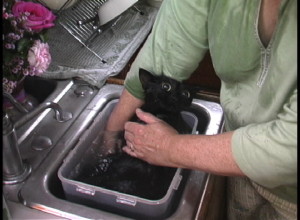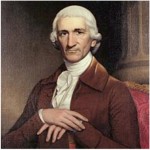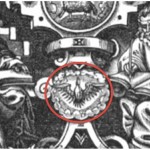
This week our little black cat (and shipmate) Lucky passed away. She died in our arms after a long illness. Jan had been feeding her with a syringe and we gave her water through an eyedropper, but it was her time and it broke our heart.
Lucky truly was lucky. We found her twelve years ago cowering under a black car on hot, black asphalt in Phoenix, Arizona. The thermometer read “117 degrees.” The little kitten fit in the palm of my hand and was nearly gone. Only Jan’s sharp ears heard her little cry for help. We raced to a drive-thru and got a cup of ice water. Jan piped water into Lucky through a straw while I drove home wondering where I was going to bury this kitten, but Lucky was always a scrapper and made it through the night and then lived with us on our sailboat, Santa Teresa for five years before moving with us into the parsonage.
During her life, Lucky fell into the ocean twice, accidentally hitched a ride out to sea on the San Diego Pilot boat, chased our other cat Phoebe from boom to boom and up the mast while we lived on board. Together they loved to watch the fireworks over the bay each night.
I don’t know that we will ever adopt another pet. It is just too painful to say good-bye. Even King David was enraged when the Prophet Nathan told him a story about a rich man abusing a poor man’s pet (1 Samuel 12). Lucky – like most pets – gave us so much more than she ever asked for.
“So do our pets go to heaven too?” I am asked. While the definitive answer to that question must remain in my famous notebook (where it awaits God’s answer after I die), I am strongly inclined to say, “Yes.” Even Solomon contemplated this question in Ecclesiastes 3:19-21. So when I think about Lucky, I take comfort in Paul’s observation:
Romans 8:19 For the creation waits with eager longing for the revealing of the sons of God. 20 For the creation was subjected to futility, not willingly, but because of him who subjected it, in hope 21 that the creation itself will be set free from its bondage to corruption and obtain the freedom of the glory of the children of God.
Lucky and the rest of creation is waiting for that great day but there is a difference. Lucky might have been naughty (ask me about the mattress on my bunk), but she never sinned. Can we say the same thing?








